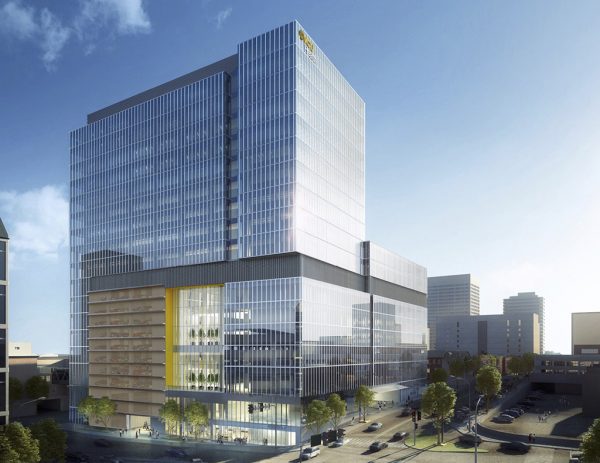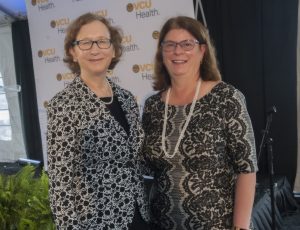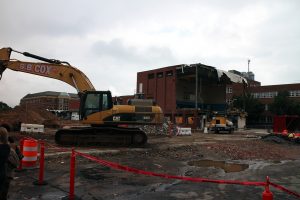Last Friday, VCU Health broke ground on its priciest project yet: a $349 million adult outpatient facility at the corner of North 10th and East Leigh streets that will add more than 1 million square feet to its campus.
The new 16-story, 603,000-square-foot building will rise on the site of VCU’s former Virginia Treatment Center for Children, which has moved to a new, $56 million Northside facility.
The building will house most of the VCU Massey Cancer Center’s outpatient services, along with labs, women’s and rehabilitation services, and clinics currently at its Ambulatory Care Center, North Hospital and Nelson Clinic. A 472,000-square-foot parking deck with over 1,000 spaces also will be included in the project.
Approved last June, the project is set to be completed in summer 2020. Hourigan is the general contractor and HDR is the architect.
The new outpatient facility will sit catty-corner to VCU’s $87 million School of Allied Health Professions building, which is under construction and set to be open in fall 2019.
With operating revenue of over $3 billion and more than 13,000 employees, VCU Health is amid a master plan to transform its medical campus, for which the outpatient facility will be a major hub.
Ahead of the groundbreaking, BizSense sat down with Marsha Rappley, VCU Health CEO and vice president for VCU Health Sciences, and Deborah Davis, VCU Hospitals and Clinics CEO, to discuss planning the project, the challenges that come with being a public health system and more.
(The following is an edited transcript)
Richmond BizSense: This facility is the priciest in VCU Health’s history. Describe the planning process for the project.
Deborah Davis: This goes all the way back to 2008. At that point we undertook a master-planning effort for the downtown campus, understanding that a number of our facilities date back to the ’50s and ’60s.
So we started looking because we’re on a fairly tight footprint. It takes a lot of long-term planning about how you take down old facilities, and how do we make sure we have new facilities operational before we do that.
Marsha Rappley: And it’s also about transitioning the people that are in those spaces, like patients and staff. We have to keep our business open 24/7, so how do we accommodate peoples’ needs as we’re changing the location of where they receive their care in a way that’s comfortable for them? (Planning) must happen in a certain sequence.
RBS: Michael Rao, president of VCU and VCU Health System, said that this building marks ‘one step closer to our vision of becoming the nation’s premier health system.’ You all are tasked with leading that. What’s it like to lead such an ambitious effort?
MR: It’s a relentless pursuit of excellence; that’s one of our taglines and it is just exactly that. You never say, ‘Oh this is good enough’ or ‘OK, we’re satisfied with this level of quality, we don’t need more than that.’
We identify the things that distinguish the finest of medical centers, and the quality and safety of the patient experience are highest on that list. In some places it’s thought you shouldn’t state something quite so aspirational. But we would rather set our sights on something as worthy as that, so we have a sense of purpose of what we’re working towards.
DD: And it includes being an academic medical center. We also want to be a premier academic facility, and that means also we have to look for transformational ways to integrate our research. We train a tremendous number of the future providers. In any particular year, we train about 5,200 learners that come through our health science campus. So when we create these new spaces, we’re looking for ways on how to integrate all of what we do.
RBS: Being a public university, VCU has a lot of financial support from the state, to go along with private donations. How does having that resource affect how you go about planning things like this new facility?
MR: Those resources don’t fully cover the cost of our responsibilities. So while we do have resources others might not have, we have responsibilities others might not touch with a 10-foot pole.
Like being a safety-net hospital. We were created to provide care for those that do not have insurance or are poorly insured. We take care of some very vulnerable groups of people: prisoners, children with mental health needs and their families, burn patients, level 1 trauma, unique pathogens.
DD: Those are all obligations that we have to stand ready to take care of patients, and that’s across the entire commonwealth.
MR: So we do have extra resources that are provided to us for that purpose and we use them for that purpose, and we’re very grateful for them.
And then we have the privilege of working in discovery, and research is that unique environment in which someone takes a passion for the need for a cure and takes it on. In my 40 years in health care, I’ve seen many, many diseases almost completely cured. To be part of that is really a privilege.
RBS: What’s next for VCU Health?
DD: We’ve begun the design and development of a new inpatient facility. It will replace our current inpatient North Hospital that was built in 1956. It’ll allow us to move to all-private rooms and allow us to create different facilities for our inpatient children’s hospital.
RBS: Do you have locations you’re scouting?
DD: It’ll be on this campus, so we’ll be taking down facilities already here, just like we’ve had to do here. We’ll have to again rearrange a little.
Last Friday, VCU Health broke ground on its priciest project yet: a $349 million adult outpatient facility at the corner of North 10th and East Leigh streets that will add more than 1 million square feet to its campus.
The new 16-story, 603,000-square-foot building will rise on the site of VCU’s former Virginia Treatment Center for Children, which has moved to a new, $56 million Northside facility.
The building will house most of the VCU Massey Cancer Center’s outpatient services, along with labs, women’s and rehabilitation services, and clinics currently at its Ambulatory Care Center, North Hospital and Nelson Clinic. A 472,000-square-foot parking deck with over 1,000 spaces also will be included in the project.
Approved last June, the project is set to be completed in summer 2020. Hourigan is the general contractor and HDR is the architect.
The new outpatient facility will sit catty-corner to VCU’s $87 million School of Allied Health Professions building, which is under construction and set to be open in fall 2019.
With operating revenue of over $3 billion and more than 13,000 employees, VCU Health is amid a master plan to transform its medical campus, for which the outpatient facility will be a major hub.
Ahead of the groundbreaking, BizSense sat down with Marsha Rappley, VCU Health CEO and vice president for VCU Health Sciences, and Deborah Davis, VCU Hospitals and Clinics CEO, to discuss planning the project, the challenges that come with being a public health system and more.
(The following is an edited transcript)
Richmond BizSense: This facility is the priciest in VCU Health’s history. Describe the planning process for the project.
Deborah Davis: This goes all the way back to 2008. At that point we undertook a master-planning effort for the downtown campus, understanding that a number of our facilities date back to the ’50s and ’60s.
So we started looking because we’re on a fairly tight footprint. It takes a lot of long-term planning about how you take down old facilities, and how do we make sure we have new facilities operational before we do that.
Marsha Rappley: And it’s also about transitioning the people that are in those spaces, like patients and staff. We have to keep our business open 24/7, so how do we accommodate peoples’ needs as we’re changing the location of where they receive their care in a way that’s comfortable for them? (Planning) must happen in a certain sequence.
RBS: Michael Rao, president of VCU and VCU Health System, said that this building marks ‘one step closer to our vision of becoming the nation’s premier health system.’ You all are tasked with leading that. What’s it like to lead such an ambitious effort?
MR: It’s a relentless pursuit of excellence; that’s one of our taglines and it is just exactly that. You never say, ‘Oh this is good enough’ or ‘OK, we’re satisfied with this level of quality, we don’t need more than that.’
We identify the things that distinguish the finest of medical centers, and the quality and safety of the patient experience are highest on that list. In some places it’s thought you shouldn’t state something quite so aspirational. But we would rather set our sights on something as worthy as that, so we have a sense of purpose of what we’re working towards.
DD: And it includes being an academic medical center. We also want to be a premier academic facility, and that means also we have to look for transformational ways to integrate our research. We train a tremendous number of the future providers. In any particular year, we train about 5,200 learners that come through our health science campus. So when we create these new spaces, we’re looking for ways on how to integrate all of what we do.
RBS: Being a public university, VCU has a lot of financial support from the state, to go along with private donations. How does having that resource affect how you go about planning things like this new facility?
MR: Those resources don’t fully cover the cost of our responsibilities. So while we do have resources others might not have, we have responsibilities others might not touch with a 10-foot pole.
Like being a safety-net hospital. We were created to provide care for those that do not have insurance or are poorly insured. We take care of some very vulnerable groups of people: prisoners, children with mental health needs and their families, burn patients, level 1 trauma, unique pathogens.
DD: Those are all obligations that we have to stand ready to take care of patients, and that’s across the entire commonwealth.
MR: So we do have extra resources that are provided to us for that purpose and we use them for that purpose, and we’re very grateful for them.
And then we have the privilege of working in discovery, and research is that unique environment in which someone takes a passion for the need for a cure and takes it on. In my 40 years in health care, I’ve seen many, many diseases almost completely cured. To be part of that is really a privilege.
RBS: What’s next for VCU Health?
DD: We’ve begun the design and development of a new inpatient facility. It will replace our current inpatient North Hospital that was built in 1956. It’ll allow us to move to all-private rooms and allow us to create different facilities for our inpatient children’s hospital.
RBS: Do you have locations you’re scouting?
DD: It’ll be on this campus, so we’ll be taking down facilities already here, just like we’ve had to do here. We’ll have to again rearrange a little.





